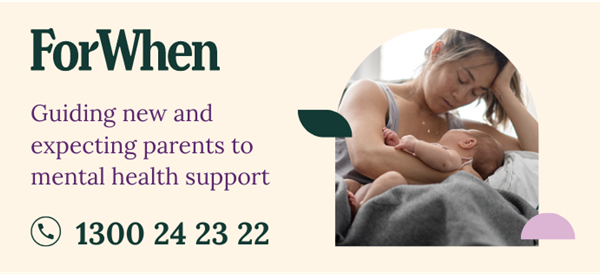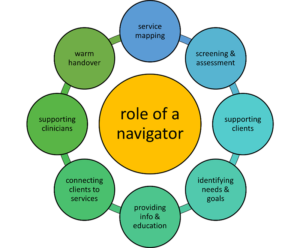Parents reaching out for a lifeline
Perinatal mental health challenges are common, affecting 1 in 5 parents during pregnancy and the early years of their child’s life. Some parents are at greater risk, including those with a history of mental health diagnoses, lack of social support, low parenting self-efficacy, a traumatic birth experience, and poor relationship quality or a partner facing mental health challenges (Chen et al., 2022; Hutchens & Kearney, 2020; van der Zee-van et al., 2021). If left untreated, mental health challenges can have long-term impacts on the entire family, impacting parenting, relationships, and child development (Myers & Johns, 2018; Netsi et al., 2018).
Recent years have seen increased awareness of perinatal mental health disorders around the world (Howard & Khalifeh, 2020), and the development of major policy initiatives such as the UK’s Antenatal and Postnatal Mental Health Guidelines (National Institute for Health and Care Excellence, 2014), and the Mental Health Care in the Perinatal Period: Australian Clinical Practice Guidelines (Highet, 2023). However, parents continue to face barriers in accessing the mental health care they need, including individual-level barriers such as shame and stigma, time, or logistical factors, and service-level barriers including limited availability and fragmented service landscapes (Byatt et al., 2012; Howard & Khalifeh, 2020).
ForWhen: a perinatal and infant mental health care navigation service for new and expectant parents
ForWhen (www.forwhenhelpline.org.au) is a national perinatal and infant mental health care navigation service, the first of its kind in Australia. The service is funded by the Australian federal government and delivered by a consortium of early parenting service providers, led by Karitane, a non-government organisation providing parenting support for over 100 years. ForWhen aims to connect new and expectant parents with timely mental health services and supports. Parents access the service through a referral from their health professional such as a general practitioner, midwife, or community-based child and family health nurse, or by directly calling a national phoneline themselves where they are connected with a local state-based Navigator. ForWhen also supports health professionals by providing expert guidance and information related to perinatal and infant mental health, support options, and referral pathways. Since launching in February 2022, ForWhen has supported over 6000 families located around Australia.

This article will illustrate the ForWhen care navigation model through four client case studies1, highlighting the ways in which care navigation can help parents navigate access to mental health care for themselves and their babies.
Case Study 1: Linh. Linh had a smooth pregnancy – she felt healthy, kept up with exercise, and prepared for the arrival of her first baby. When her son’s birth was a “terrible” experience, it was far from her expectations, and she struggled to come to terms with it. Following the birth, Linh faced a difficult physical recovery including pelvic floor issues, and pain and engorgement from breastfeeding. The trauma of the birth left her grappling with feelings of disappointment and self-blame. To make things even harder, Linh was very isolated. She had a good support in her husband, but he was soon back to working full-time and their extended family lived overseas. Linh had wonderful childhood memories of being raised by “the village” in her home country but she didn’t have this kind of support network in Australia. As her son grew, while she felt deeply connected to him, she found it difficult to cope with his disrupted sleep, and eventually attended a parenting service for sleep and settling support. It was here that Linh disclosed thoughts of wanting to disappear, and a nurse referred her to ForWhen.
Case Study 2: Callum. When Callum’s partner Emma went into labour at 35 weeks pregnant, it caught both of them completely off guard. This would be their first child, and everything about the experience felt new and daunting. Their son Eli was born premature and needed immediate medical attention including oxygen support; the sight of their tiny baby surrounded by medical equipment was frightening. When the new family were finally sent home together a couple of weeks later, they were relieved, but exhausted. Then, just as they were beginning to feel settled, Emma developed a severe fever and was readmitted to hospital. This time they were on a general ward, without any support from postnatal specialists. Callum found himself taking on multiple roles – learning to be a father while caring for Eli around the clock and supporting Emma through her illness. Though well-meaning, friends and family offered advice that seemed out of touch with their reality, and Callum felt overwhelmed and alone. It wasn’t until a scheduled checkup for Eli that an early childhood nurse recognised Callum’s distress and offered to help him call ForWhen.
Case Study 3: Brooke. Brooke had a planned pregnancy and was excited to become a mother. However, when she was 6-months pregnant, her partner left, revealing a pattern of infidelity and drug use. After her baby was born, Brooke felt devastated to be navigating the journey of new parenthood on her own, and she experienced postpartum infections that required hospitalisation and prolonged antibiotic treatment. She relocated with her baby to a country town to be closer to family but struggled with the lack of local health and parenting services. Despite having no prior mental health history, Brooke’s emotional state deteriorated rapidly. She experienced a growing sense of disconnect from her baby, feelings of guilt, and intrusive and disturbing thoughts of harming herself and her daughter. Feeling desperate for help, Brooke used a health app on her phone to scroll through a list of mental health services and came across ForWhen, and she called the number.
Case Study 4: Alex. The first few months of fatherhood were a whirlwind for Alex. By the time his son was a few weeks old, Alex was back to full-time work. He had always been a light sleeper, and now sharing a room with his partner and newborn baby, he often only managed two hours of sleep a night. Compounding both parents’ feelings of overwhelm was a traumatic birth experience which was marked by confusion and poor communication from hospital staff. After this distressing experience, Alex had advocated for his partner’s need for mental health support and a formal debrief with the hospital. However, he found little support available for himself as a dad. The pressures of helping in the care of a newborn and working full-time, while supporting his partner through her own anxiety, left him feeling frustrated and it was impacting his ability to connect with his son. Prior to the birth, he had seen a psychologist for help managing stress and he recognised the value of professional support. As the pressures of new parenthood mounted, he knew he needed help again, so one day on his way to work he picked up the phone and called ForWhen.
The navigation approach
A Navigator’s role is to support and guide clients through the healthcare system, connecting them with services that meet their specific needs, and working with clients to problem-solve around barriers to access. Originating in the field of cancer care (Freeman & Rodriguez, 2011), care navigation has been adopted across diverse health and social care settings, often in response to the recognition that those with complex needs are not accessing the services they need. Navigator competency frameworks – such as the NHS Care Navigation Competency Framework – have been developed to define the skills of Navigators and conceptualise their role within health and social care systems. There are now many examples of navigation services designed to support children and families with complex needs, including for perinatal and infant mental health concerns (Harris et al., 2023).
ForWhen Navigators are health professionals (e.g., nurses, midwives, social workers, psychologists) with specialist training or experience in perinatal and infant mental health. When someone rings ForWhen, their call is answered by a Navigator located in their state or territory, who has a thorough understanding of the services available in the local jurisdiction. The Navigator speaks with the caller to 1) understand their mental health concerns, assess safety and risks to themselves and their infant/s, and identify supportive factors, 2) provide information, psychoeducation, and emotional support, and 3) work collaboratively with the caller to identify their needs and connect them with services appropriate to their circumstances (Harris et al., 2024). Most parents are referred to specialist perinatal counselling or psychology services, though some are navigated to additional services such as parenting support or domestic and family violence services. ForWhen Navigators aim to make parents feel validated and supported and help them to connect to the ‘right’ help at the ‘right’ time. This is expected to ease the client’s burden of trying to access care while facing mental health challenges and being pregnant or caring for a young baby. ForWhen Navigators also support other clinicians by providing expert advice on perinatal and infant mental health treatment and referral options, and by sharing assessment information (with the client’s consent) to facilitate warm handover of care between services.

Case Study 1: Linh. Linh was initially ambivalent about seeking mental health support, but once connected with Navigator Sara2, she felt a sense of relief. Linh was struck by Sara’s ability to listen and understand her situation, and that she remembered details of Linh’s story each time they spoke, so she never had to repeat herself. Sara supported Linh with strategies to improve her son’s sleep and better communicate with her husband, to put in boundaries and open up about her needs. Linh was eager for resources about motherhood and parenting, so Sara shared articles and podcasts relevant to Linh’s situation. These resources and psychoeducation provided by Sara gave Linh a language to understand some of the things she was going through. Meanwhile, they worked on getting Linh connected to the right perinatal mental health support. Linh needed access to a no-cost service, but there was a 4-6 week wait. Sara helped Linh get the referral organised and was able to check in and support her until her first appointment.
Case Study 2: Callum. “Sara immediately felt like the first person who understood absolutely everything I was going through, and everything I needed in that moment”, recalls Callum. Sara recognised that Callum needed space to unload and debrief about what he and his family were going through. She listened to his story, validating his feelings and experiences. She talked with Callum about setting boundaries and reassured him that it was okay to focus on his own family and to limit visitors – this was crucial advice for Callum, who went out of his way to accommodate others. Sara also provided psychoeducation on bonding and attachment, addressing his anxieties about Emma’s ability to bond with Eli, especially since breastfeeding was a challenge due to her illness. As a ForWhen Navigator, Sara maintained links with psychology practices and was able to organise a timely appointment for Callum with a perinatal specialist. With Callum’s consent, Sara’s psychosocial assessment was shared with this provider for a more seamless transition of care. Over the next few weeks, Sara continued to check in with Callum, offering emotional support and practical parenting advice, until he felt he had the support in place that he needed.
Case Study 3: Brooke. When Brooke called ForWhen and disclosed thoughts of harming herself and her baby, Sara helped Brooke to safely explore these thoughts and feelings. Sara worked to identify immediate risks to mother and baby, as well as what protective factors were present. Sara worked with Brooke to create a safety plan and over the following week, she checked in with regular phone calls to make sure they were okay. Sara normalised and validated Brooke’s feelings and encouraged her to talk to her family about what was going on in her mind. Doing this was a huge turning point for Brooke. Living in a small town three hours away from the closest hospital, Sara’s support felt like a lifeline. Sara advocated to get Brooke into a mother-baby unit, a place where she could receive inpatient mental health treatment and have her daughter there with her. Thanks to Sara’s communication with the unit and her advocating for Brooke’s need for immediate support, Brooke and her baby were admitted quickly, where they received the care they desperately needed.
Case Study 4: Alex. Alex was immediately struck by Sara’s ability to listen carefully and “demystify” his concerns. He was eager to understand how his own experiences of being parented impacted his role as a father and his connection with his son. Sara sent him resources specifically designed for fathers, which he found helpful. They discussed the impact of stress and sleep deprivation at home, and strategies to improve sleep quality and communication. Within days of his initial call with Sara, Alex and his partner had made dramatic changes in their lives, opening up conversations about family dynamics and the support they needed from each other. Sara also connected him to a Circle of Security program, which helped him better understand his baby’s needs. Alex felt Sara was “in the trenches” with him, providing emotional and practical support during a difficult period.
Benefits for families
A recent evaluation of the ForWhen service has shown that after engaging with a ForWhen Navigator, clients experience significant reductions in psychological distress, and improvements in parental self-efficacy and parent-infant bonding (Kohlhoff et al., forthcoming). In interviews and focus groups, clients and health professionals have highlighted the way in which Navigators are able to support families who might otherwise miss out on essential services (Harris et al., forthcoming). The case studies reported here enrich these findings, by illustrating the outcomes of the ForWhen service for four clients and their family members, with positive impacts on mental health, family functioning, and overall wellbeing.
Case Study 1: Linh. For Linh, the trust and rapport built with Sara was key: “I felt like tonnes of weight had been removed from my shoulders after each conversation, and I could breathe better, and see better.” Sara taught her to be more compassionate with herself as a parent, and to show her child it’s okay to feel emotions and not bottle them up. Linh reflected on how these transformations in herself had helped her whole family: “It’s not just my life, it’s a ripple in the water. It helps my husband; it helps my baby.”
Case Study 2: Callum. Before contacting ForWhen, Callum had tried reaching out to a couple of services but encountered long hold times and waitlists. He lacked the time and energy to pursue these options, and also felt lost as to which service might be most appropriate for him. Reflecting on how hard it was to try and access support, Callum said: “I had no time or energy to get a referral and navigate that system when I’ve got a screaming baby I’m caring for on my own”. With Sara’s support in identifying his needs and locating services that were appropriate and available to him, Callum transitioned to seeing a perinatal psychologist. Although immensely challenging, Callum felt that their early postpartum experiences had strengthened his relationship with Emma, as Sara’s advice to practice self-compassion and prioritise their family helped them navigate this difficult period together.
Case Study 3: Brooke. Today, Brooke’s daughter is 14 months old and thriving. Reflecting on her experience, Brooke believes that the ForWhen service achieved exactly what it was meant to do – to navigate her through the darkest period of her life. She feels that Sara’s reassurance, encouragement, and advocacy was crucial in getting her and her daughter the level of support they needed. Brooke told Sara, “I think you may have just saved my life.”
Case Study 4: Alex. Alex’s experience of new fatherhood highlights the fact that with the arrival of a baby, fathers are often juggling workload and work-life balance, financial pressures, sleep deprivation, and shifting relationship dynamics. Yet Alex felt that there is still the prevailing assumption that parenting is all mums’ responsibility. Alex believes ForWhen could greatly benefit more men by providing targeted support and normalising perinatal mental health challenges amongst fathers and non-birth partners – because “you need to support fathers as well, to create an effective team”.
These cases are a testament to the transformative power of tailored and compassionate mental health support in addressing the unique challenges faced by families during the perinatal period. Navigators work with parents to understand their concerns, help them identify available strengths and supports, and normalise difficult thoughts and feelings they may encounter in the journey of new parenthood. Clients have reported that the support of Navigators helped to build their parenting confidence, improve their relationship with their partner and infant, and reduce the stigma associated with perinatal mental health challenges. By providing holistic care, addressing individual needs and circumstances, and reducing barriers to care access, navigation services like ForWhen can offer a lifeline to parents, to ensure timely support and promote early intervention and long-term benefits for parents, infants, and families.
- Names have been changed throughout to protect participant anonymity.
- For the purposes of this article, we have used a single Navigator pseudonym. Clients are connected to a local Navigator based in their state/territory.
References
Byatt, N., Biebel, K., Lundquist, R. S., Moore Simas, T. A., Debordes-Jackson, G., Allison, J., & Ziedonis, D. (2012). Patient, provider, and system-level barriers and facilitators to addressing perinatal depression. Journal of Reproductive and Infant Psychology, 30(5), 436-449.
Chen, Y., Ismail, F., Xiong, Z., Li, M., Chen, I., Wen, S. W., & Xie, R. h. (2022). Association between perceived birth trauma and postpartum depression: A prospective cohort study in China. International Journal of Gynecology & Obstetrics, 157(3), 598-603.
Freeman, H. P., & Rodriguez, R. L. (2011). History and principles of patient navigation. Cancer, 117(15 Suppl), 3539-3542.
Harris, S. A., Eapen, V., & Kohlhoff, J. (2024). Implementing a National Navigation Service for Perinatal and Infant Mental Health: Early Learnings from the ForWhen Model. Community Mental Health Journal, 60, 581-588.
Harris, S. A., Harrison, M., Hazell‐Raine, K., Wade, C., Eapen, V., & Kohlhoff, J. (2023). Patient navigation models for mental health of parents expecting or caring for an infant or young child: A systematic review. Infant mental health journal, 44(4), 587-608.
Harris, S. A., Traynor, N., Vorgias, J., Eapen, V., & Kohlhoff, J. (forthcoming). “Not Just Another Number”: Client and Healthcare Provider Experiences Using a National Perinatal & Infant Mental Health Navigation Service.
Highet, N., and the Expert Working Group. (2023). Mental Health Care in the Perinatal Period: Australian Clinical Practice Guideline. Melbourne: Centre of Perinatal Excellence (COPE).
Howard, L. M., & Khalifeh, H. (2020). Perinatal mental health: a review of progress and challenges. World Psychiatry, 19(3), 313-327.
Hutchens, B. F., & Kearney, J. (2020). Risk factors for postpartum depression: an umbrella review. Journal of midwifery & women’s health, 65(1), 96-108.
Kohlhoff, J., Harris, S. A., Traynor, N., Vorgias, J., & Eapen, V. (forthcoming). Clinical outcomes of a perinatal and infant mental health care navigation service.
Myers, S., & Johns, S. E. (2018). Postnatal depression is associated with detrimental life-long and multi-generational impacts on relationship quality. PeerJ, 6, e4305.
National Institute for Health and Care Excellence. (2014). Antenatal and postnatal mental health: clinical management and service guidance.
Netsi, E., Pearson, R. M., Murray, L., Cooper, P., Craske, M. G., & Stein, A. (2018). Association of persistent and severe postnatal depression with child outcomes. JAMA psychiatry, 75(3), 247-253.
van der Zee-van, A. I., Boere-Boonekamp, M. M., Groothuis-Oudshoorn, C. G., & Reijneveld, S. A. (2021). Postpartum depression and anxiety: a community-based study on risk factors before, during and after pregnancy. Journal of affective disorders, 286, 158-165.
Authors
Harris, Sophia A.,
Australia
Arnall, Jessica,
Australia
Walls, Penny,
Australia
Leuenberger, Megan,
Australia
Hughes, Melanie,
Australia
Cook, Alison,
Australia
Eapen, Valsamma,
Australia
Kohlhoff, Jane,
Australia








